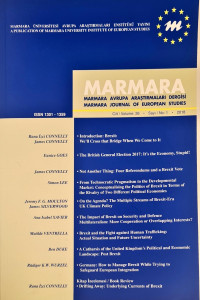Abstract
Should we agree with Tom Peck that David Cameron was the “Worst Prime Minister in a Hundred Years?” (2016). Joseph Butler once stated that “Everything is what it is, and not another thing” and that “Things and actions are what they are, and the consequences of them will be what they will be: why, then, should we desire to be deceived?” (Butler, 1841: Preface; 76). TheUnited Kingdom (UK) is now faced with the claim that “Brexit means Brexit” –a vacuous phrase which palpably begs the question at issue. For the issue is: what is Brexit? and what type of Brexit was voted for? To say that “Brexitmeans Brexit” is whistling in the dark as a means to ward off unwelcome spirits and to conjure up an appearance of resolve. This paper argues that the referendum on whether the UK should stay in the European Union was held by the then Prime Minister, David Cameron, to satisfy internal party critics and the campaign conducted in a manner inspired by his previous success in holding and winning referendums. Further, it argues that it has unleashed a new doctrine: that of the referendum result as an expression of the undiluted‘will of the people’. The holding of the referendum, its conduct and its result were direct results of complacency and hubris; what precisely a vote for Brexit means is unclear and ambiguous, and the populist belief that the result has to be upheld because it expresses the ‘will of the people’ is both cause and consequence of the referendum campaign and result.
References
- Saunders, R. (2016) “A tale of two referendums: 1975 and 2016”, Political Quarterly, 87 (3): 318-22.
- Shaw, J. (2017) “The quintessentially democratic act? Democracy, political community and citizenship in and after the UK’s EU referendum,” Journal of European Integration, 39(5): 559-74.
- Weber, M. (1994) “The Profession and Vocation of Politics” in P. Lassman and R. Speirs (eds.), Weber: Political Writings, (Cambridge: Cambridge University Press), pp: 309-369.
Abstract
Should we agree with Tom Peck that David Cameron was the “Worst Prime Minister in a Hundred Years?” (2016). Joseph Butler once stated that “Every thing is what it is, and not another thing” and that “Things and actions arewhat they are, and the consequences of them will be what they will be: why, then, should we desire to be deceived?” (Butler, 1841: Preface; 76). TheUnited Kingdom (UK) is now faced with the claim that “Brexit means Brexit” –a vacuous phrase which palpably begs the question at issue. For the issue is: what is Brexit? and what type of Brexit was voted for? To say that “Brexitmeans Brexit” is whistling in the dark as a means to ward off unwelcome spirits and to conjure up an appearance of resolve. This paper argues that the referendum on whether the UK should stay in the European Union was held by the then Prime Minister, David Cameron, to satisfy internal party critics and the campaign conducted in a manner inspired by his previous success in holding and winning referendums. Further, it argues that it has unleashed a new doctrine: that of the referendum result as an expression of the undiluted‘will of the people’. The holding of the referendum, its conduct and its result were direct results of complacency and hubris; what precisely a vote for Brexit means is unclear and ambiguous, and the populist belief that the result has to be upheld because it expresses the ‘will of the people’ is both cause and consequence of the referendum campaign and result.
References
- Saunders, R. (2016) “A tale of two referendums: 1975 and 2016”, Political Quarterly, 87 (3): 318-22.
- Shaw, J. (2017) “The quintessentially democratic act? Democracy, political community and citizenship in and after the UK’s EU referendum,” Journal of European Integration, 39(5): 559-74.
- Weber, M. (1994) “The Profession and Vocation of Politics” in P. Lassman and R. Speirs (eds.), Weber: Political Writings, (Cambridge: Cambridge University Press), pp: 309-369.
Details
| Primary Language | English |
|---|---|
| Journal Section | Makaleler |
| Authors | |
| Publication Date | August 1, 2018 |
| Published in Issue | Year 2018 Volume: 26 Issue: 1 |


